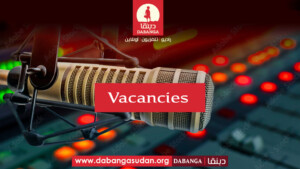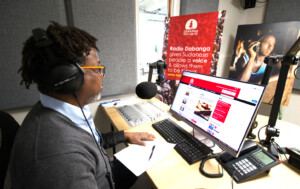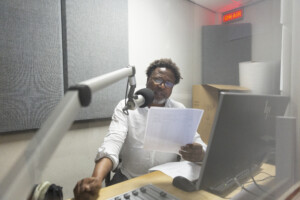‘Radio Dabanga has grilled and devoured us’: Sudan MPs
The Sudanese government has outlined ‘radical measures’ to attempt to jam and disrupt broadcasts by Radio Dabanga. On Tuesday, the Information Minister of State, Yasir Yousef, revealed to Parliament in Khartoum that he has had “extensive contacts with the industrial Nilesat and Arabsat satellites to disrupt Radio Dabanga’s broadcasts from the Netherlands via its satellites and the European satellites”. Several newspapers in Khartoum reported on the Minister’s announcement on Wednesday. The Minister said that “the radical solution for curbing Radio Dabanga is to shift from analogue to digital broadcasting”. MPs stressed the wide spread of Radio Dabanga’s broadcasts and “the vast number of listeners the radio station has in Sudan, especially in the Darfur camps”. Yousef complained that “some commissioners from the States of Darfur along with some constitutionalists and officials in Khartoum are in collaboration with Radio Dabanga”. He asked the Parliament to adopt a decision banning them from collaborating with Radio Dabanga or receiving the station’s calls. During their deliberations, MPs stressed the need “to disrupt the activity of Radio Dabanga or completely stop it. Radio Dabanga has frequently grilled and devoured us”. They accused the State media of being weak, almost non-existent and with no viewer or listener base at Arab and African level. They asked the Ministry to establish radio stations, channels, newspapers and a Sudanese satellite to counter Radio Dabanga. The Speaker of Parliament, El Fateh Izzeldin gave the Ministry of Information a one-month ultimatum to create a remedial plan to cover the conflict zones in Darfur, Blue Nile and South Kordofan. He said: “The occupation of the land may be justified, but it is better to see justification for occupation of space through media”. MP Abdeljabbar Hasaballah acknowledged that Radio Dabanga is widely heard and viewed. He criticised “the constitutionalists and the Commissioners” for allowing the Radio to call them to discuss their local and international issues. He asked Parliament to issue strict directives to the constitutionalists and MPs not to cooperate with Radio Dabanga. MP Musa Madibbo stressed that “Radio Dabanga has vast influence on the citizens”. He said that during his tours as a commissioner around the camps, he found many citizens gathered around the radio in groups to listen to the station’s broadcasts. He added he has already drawn the attention of the officials to this without getting any response. Radio Dabanga broadcasts in shortwave to the whole of Sudan and neighbouring countries. Satellite broadcasts are confined to the larger cities. (See elsewhere on this site for audio feeds.) File photo: Women listening to the radio in Darfur Related:Sudanese journalists condemn ‘abuses of power’ (25 November 2014)Sudan rejects Security Council request to investigate alleged mass rape Tabit (20 November 2014)Radio Dabanga ‘top station’ in Darfur and Kordofan (21 May 2014)
The Sudanese government has outlined ‘radical measures’ to attempt to jam and disrupt broadcasts by Radio Dabanga.
On Tuesday, the Information Minister of State, Yasir Yousef, revealed to Parliament in Khartoum that he has had “extensive contacts with the industrial Nilesat and Arabsat satellites to disrupt Radio Dabanga’s broadcasts from the Netherlands via its satellites and the European satellites”. Several newspapers in Khartoum reported on the Minister’s announcement on Wednesday.
The Minister said that “the radical solution for curbing Radio Dabanga is to shift from analogue to digital broadcasting”. MPs stressed the wide spread of Radio Dabanga’s broadcasts and “the vast number of listeners the radio station has in Sudan, especially in the Darfur camps”.
Yousef complained that “some commissioners from the States of Darfur along with some constitutionalists and officials in Khartoum are in collaboration with Radio Dabanga”. He asked the Parliament to adopt a decision banning them from collaborating with Radio Dabanga or receiving the station's calls.
During their deliberations, MPs stressed the need “to disrupt the activity of Radio Dabanga or completely stop it. Radio Dabanga has frequently grilled and devoured us”. They accused the State media of being weak, almost non-existent and with no viewer or listener base at Arab and African level. They asked the Ministry to establish radio stations, channels, newspapers and a Sudanese satellite to counter Radio Dabanga.
The Speaker of Parliament, El Fateh Izzeldin gave the Ministry of Information a one-month ultimatum to create a remedial plan to cover the conflict zones in Darfur, Blue Nile and South Kordofan. He said: “The occupation of the land may be justified, but it is better to see justification for occupation of space through media”.
MP Abdeljabbar Hasaballah acknowledged that Radio Dabanga is widely heard and viewed. He criticised “the constitutionalists and the Commissioners” for allowing the Radio to call them to discuss their local and international issues. He asked Parliament to issue strict directives to the constitutionalists and MPs not to cooperate with Radio Dabanga.
MP Musa Madibbo stressed that "Radio Dabanga has vast influence on the citizens". He said that during his tours as a commissioner around the camps, he found many citizens gathered around the radio in groups to listen to the station's broadcasts. He added he has already drawn the attention of the officials to this without getting any response.
Radio Dabanga broadcasts in shortwave to the whole of Sudan and neighbouring countries. Satellite broadcasts are confined to the larger cities. (See elsewhere on this site for audio feeds.)
File photo: Women listening to the radio in Darfur
Related:
Sudanese journalists condemn ‘abuses of power’ (25 November 2014)
Sudan rejects Security Council request to investigate alleged mass rape Tabit (20 November 2014)
Radio Dabanga 'top station' in Darfur and Kordofan (21 May 2014)











 and then
and then